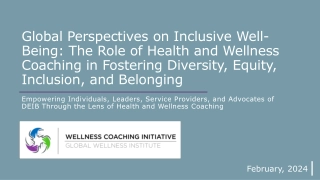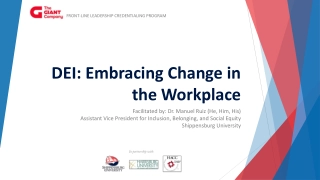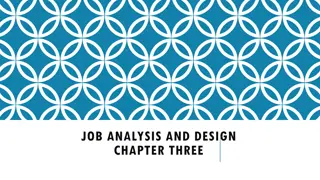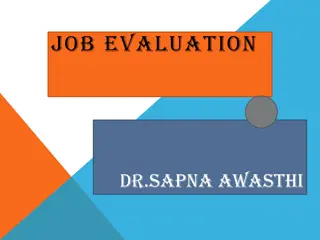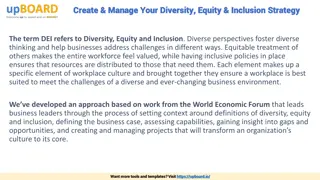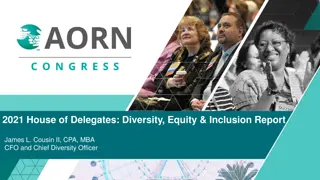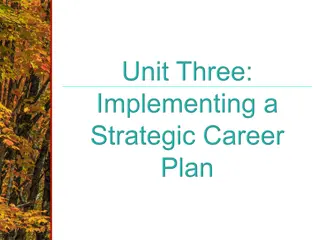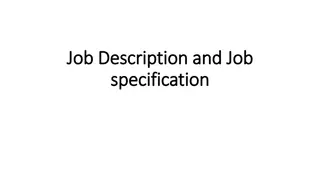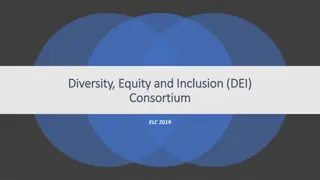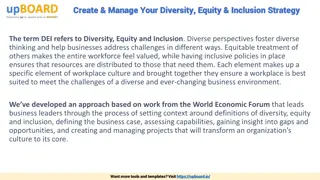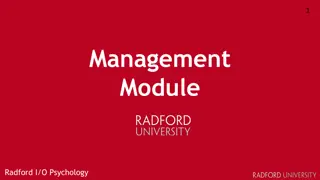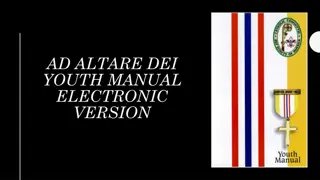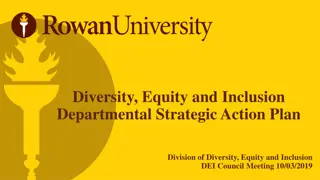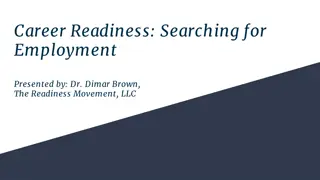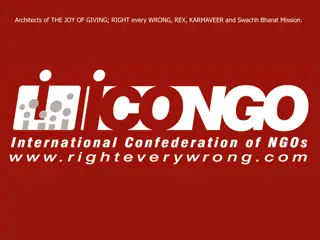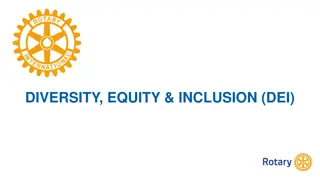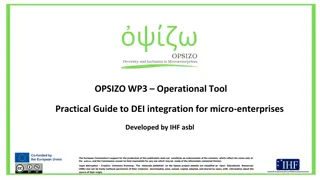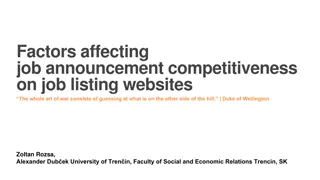
Prioritizing Diversity, Equity, and Inclusion in Academia Job Market
Discover the importance of Diversity, Equity, and Inclusion (DEI) in academia's job market, including insights on finding DEI-focused job opportunities, crafting application materials, and advocating for DEI post-hiring. Learn how DEI fosters innovation, reduces biases, and enhances academic environments.
Download Presentation

Please find below an Image/Link to download the presentation.
The content on the website is provided AS IS for your information and personal use only. It may not be sold, licensed, or shared on other websites without obtaining consent from the author. If you encounter any issues during the download, it is possible that the publisher has removed the file from their server.
You are allowed to download the files provided on this website for personal or commercial use, subject to the condition that they are used lawfully. All files are the property of their respective owners.
The content on the website is provided AS IS for your information and personal use only. It may not be sold, licensed, or shared on other websites without obtaining consent from the author.
E N D
Presentation Transcript
Championing DEI in the Job Market Gloria E. Poveda, Ph.D. August 29, 2024 OWCA Webinar
Agenda Finding DEI- Focused Job Opportunities Crafting DEI Application Materials Understanding DEI in Academia Navigating the Interview Process Challenges and Counterarguments Advocating for DEI Post-Hiring Q&A and Conclusion
Diversity: Involves the presence of differences within a given setting. In the context of academia, this includes race, ethnicity, gender, age, religion, disability, sexual orientation, socioeconomic status, and more. Part 1: Equity: Refers to fairness and justice in processes and outcomes. It involves identifying and eliminating barriers that prevent the full participation of some groups. Understanding DEI in the Job Market Inclusion: The practice of ensuring that diverse individuals feel welcome, valued, and integrated into all aspects of organizational operations and culture.
Importance of DEI in Academia DEI fosters a richer learning environment where diverse perspectives contribute to creativity and innovation. Studies show that diverse teams in academia and industry outperform less diverse teams because they bring a variety of perspectives, experiences, and solutions. DEI initiatives help to reduce biases and promote social justice, making educational institutions more reflective of society's diversity.
An increasing number of academic institutions are prioritizing DEI in their hiring practices due to growing awareness and advocacy. Current Landscape Universities and colleges are increasingly required to publish DEI reports, outlining their progress and commitments. There is a growing demand for faculty and staff who can contribute to creating inclusive curricula and support diverse student populations.
Part 2: Identifying DEI-focused Job Opportunities Researching Positions Use job search platforms focusing on academic positions with strong DEI commitments, such as academic job boards with dedicated DEI sections. Look for institutions that have established diversity offices or committees, published DEI statements, or have received recognition for their DEI initiatives. Interpreting Job Descriptions Look for language that explicitly mentions a commitment to diversity, inclusion, and equity. Examples include phrases like commitment to diversity, inclusive environment, or ability to work with diverse populations. Job descriptions may also specify responsibilities related to DEI, such as developing inclusive curriculum content, participating in DEI committees, or mentoring underrepresented students.
Part 3: Preparing DEI-focused Application Materials Crafting a DEI Statement Purpose: A DEI statement communicates your understanding, experiences, and commitment to diversity, equity, and inclusion. It's often a required component of academic job applications. Key Elements to Include: Personal Experience: Share personal experiences highlighting your understanding of DEI issues. Professional Experience: Discuss specific examples of how you've contributed to DEI initiatives in your previous roles (e.g., creating inclusive curricula, organizing diversity training, mentoring underrepresented students). Future Commitment: Articulate your plans for continuing to promote DEI in your prospective role (e.g., courses you plan to develop, DEI-related research, community engagement).
Highlighting DEI in Your CV and Cover Letter CV: Include sections dedicated to DEI-related experiences, such as: Teaching Experience: Mention courses that include diverse perspectives or inclusive pedagogical practices. Service and Outreach: Highlight involvement in diversity committees, organizations, or community service that supports underrepresented groups. Cover Letter: Emphasize your commitment to DEI by linking your past experiences with the institution s DEI goals. Mention specific achievements that demonstrate your ability to foster an inclusive environment.
Part 4: Navigating the Interview Process Preparing for DEI Questions Common Questions: How have you integrated DEI principles into your teaching/research? Can you provide an example of how you have supported DEI initiatives in your previous roles? How do you create an inclusive classroom environment? Strategies for Responding: Use the STAR method (Situation, Task, Action, Result) to provide structured and impactful answers. Be specific: Discuss tangible examples of your work with diverse student groups or DEI projects.
Assessing Organizational DEI Culture Questions to Ask Potential Employers: What DEI initiatives are currently in place at your institution? How does the department support the professional development of faculty in DEI areas? Can you describe the diversity of the faculty and student body? Red Flags: Lack of concrete DEI programs or vague responses about DEI initiatives. Minimal representation of diverse faculty and leadership positions. Resistance to discussing or acknowledging DEI issues.
Part 5: Challenges and Counterarguments to DEI in Higher Education Recognizing Pushback and Counterarguments Some argue that DEI initiatives lead to tokenism or reverse discrimination, where candidates feel they are hired based on demographics rather than qualifications. Concerns about academic freedom, where DEI requirements are viewed as potentially limiting the scope of research or teaching methodologies. The belief that DEI initiatives are costly and may divert resources from other academic priorities.
Certain states and institutions have introduced policies that limit or ban affirmative action or DEI training, arguing these programs create division or are ideologically biased. Political and Legislative Challenges Some academic boards have passed resolutions challenging the incorporation of DEI into hiring or curriculum development, reflecting broader societal debates.
Responding to Challenges Highlight the research and evidence that support the benefits of diversity and inclusion for both educational outcomes and institutional success. Focus on the value of diverse perspectives in promoting critical thinking, problem- solving, and preparing students for a globalized world. Emphasize the importance of creating an inclusive environment where all students feel they belong, which can improve retention and success rates. Approach conversations about DEI with empathy and a willingness to listen, seeking common ground on the benefits of inclusive practices for all members of the academic community.
Post-Hiring DEI Advocacy Part 6: Advocating for DEI in the Workplace Ways to Contribute: Participate in or lead diversity committees or task forces within the department or institution. Develop or advocate for inclusive teaching practices and curriculum development. Mentor underrepresented students and junior faculty, providing support and guidance
Building Networks Participate in conferences, workshops, and professional organizations focused on DEI in higher education. Connect with colleagues who are also committed to DEI to share resources, strategies, and support.
Stay informed about DEI best practices through ongoing training, reading current research, and attending webinars. Continuous Professional Development Advocate for regular DEI training for all faculty and staff to promote an inclusive campus culture.
Closing Remarks Encouragement for Continued DEI Commitment Personal Responsibility: Encourage attendees to promote DEI values in their daily work and interactions, both in academia and beyond. Community Engagement: Highlight the importance of building networks with like- minded colleagues, joining DEI committees, and participating in diversity-related events and initiatives. Ongoing Learning: Emphasize the need for continuous education on DEI topics through workshops, webinars, reading, and other professional development opportunities.
Lets search job ads https://www.higheredjobs.com/
Example DEI Statement for a Job Application Diversity, Equity, and Inclusion Statement: As an educator and scholar, I am deeply committed to fostering diversity, equity, and inclusion (DEI) in all aspects of my work. My commitment is rooted in both my personal experiences and my professional journey, where I have seen firsthand the transformative power of inclusive environments. I believe that creating spaces where all individuals feel valued and respected is essential for personal growth, academic success, and the cultivation of a vibrant community. Throughout my career, I have actively engaged in initiatives that promote DEI. For example, I have developed curriculum that integrates diverse perspectives and highlights the contributions of historically marginalized groups. In my teaching, I strive to create a classroom atmosphere that is welcoming and inclusive by using diverse teaching methods, encouraging open dialogue, and being attentive to the varied learning needs of my students. I ensure that all students, regardless of their backgrounds, feel empowered to share their ideas and perspectives. Beyond the classroom, I have participated in and led workshops aimed at raising awareness about implicit bias and cultural competency. I have collaborated with colleagues to develop programs that support underrepresented students, such as mentoring initiatives and community-building events. These efforts have not only enriched the educational experiences of the students involved but have also strengthened my understanding of the barriers that exist and the strategies needed to overcome them. In my research, I am committed to exploring issues related to social justice and equity. I actively seek to engage with topics that address the systemic inequalities affecting marginalized communities. My scholarly work aims to contribute to a broader understanding of these issues and to advocate for policies and practices that promote equity and inclusion. I am inspired by the opportunity to join an institution that shares my commitment to DEI. If given the chance, I am eager to contribute my experience and passion to advance the institution's goals of creating an inclusive and equitable environment for all members of the community. I look forward to working collaboratively with colleagues, students, and community partners to continue fostering a culture of respect, empathy, and social justice.
Open Source and Free DEI Resources DEI Resources 1.Understanding DEI Concepts and Best Practices o"Advancing Diversity and Inclusion in Higher Education" A comprehensive report by the U.S. Department of Education that outlines best practices for advancing DEI in higher education. Link to Report o"Diversity and Inclusion Framework" A resource provided by the University of California, Berkeley outlines the university's approach to fostering a diverse, equitable, and inclusive environment. Link to Framework 2.Finding and Applying for DEI-focused Jobs oAcademic Jobs Wiki An open-access platform where job seekers can find listings of academic job openings, many of which are tagged with diversity-related keywords. Link to Academic Jobs Wiki oChronicleVitae A job search platform that often includes articles and tips related to DEI in academia, with many resources accessible without a subscription. Link to ChronicleVitae 3.Crafting DEI Statements o"Guide to Writing a Diversity Statement" by the University of California, San Francisco (UCSF) A practical guide for writing DEI statements, complete with examples and prompts. Link to Guide o"Writing a Diversity Statement" by the University of Michigan This resource provides tips and considerations for crafting a compelling DEI statement. Link to Guide 4.Professional Development and Networking oNational Center for Faculty Development & Diversity (NCFDD) Offers free resources and webinars for academic professionals interested in DEI issues. Link to NCFDD oSociety for Diversity Provides free access to articles, podcasts, and webinars related to DEI initiatives across different sectors, including higher education. Link to Society for Diversity 5.Addressing Challenges and Counterarguments o"The Case for Diversity and Inclusion in Higher Education" by AAC&U (Association of American Colleges & Universities) This publication provides a detailed look at the evidence supporting DEI in academic settings and how to counter common criticisms. Link to AAC&U Publication o"Responding to Opponents of Diversity, Equity, and Inclusion" A resource by the American Council on Education that outlines strategies for addressing opposition to DEI initiatives in higher education. Link to Resource

